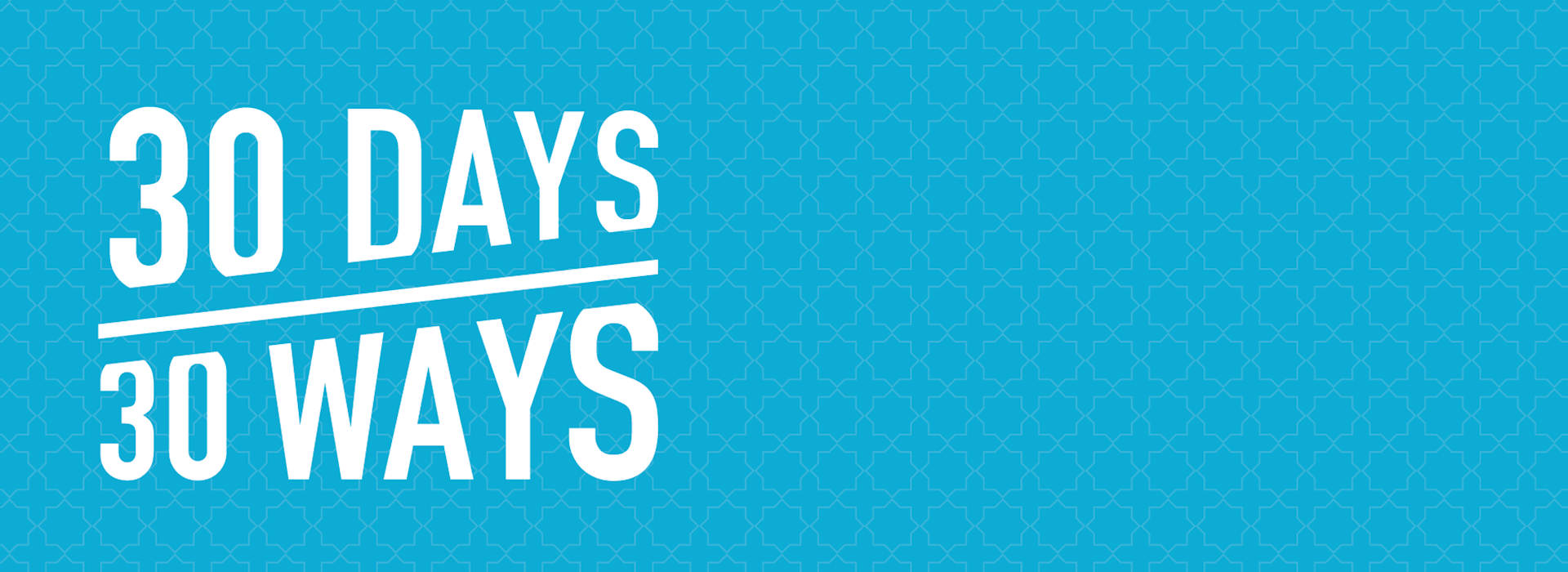
Highlights
Day Thirty
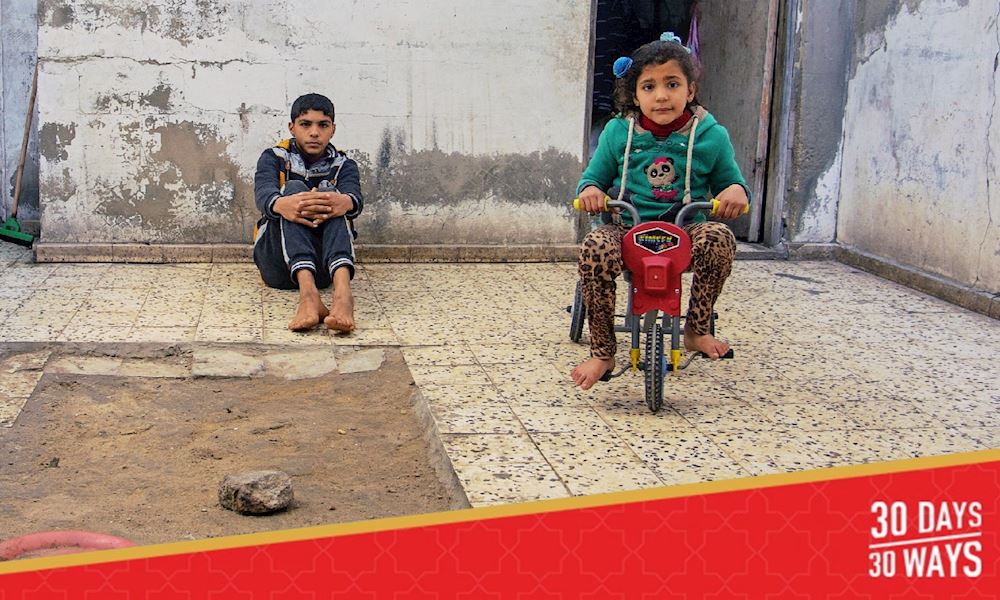
The home of 15-year-old Abu Aser, an orphan from Gaza, gets extremely cold during winter, and the humidity inside the rooms is almost suffocating. He told us, “I don’t like to spend time in my room because it’s so very cold and it smells bad because of the humidity. The courtyard is also cold but I can breathe smoothly there.” He went on to add that his little sister feels this way too and they “are particularly suffering from this same problem.”
Abu Aser is like most teenagers, he enjoys football, has a favourite subject (Arabic) and career aspiration, wanting to become a teacher. However, when we asked him what his goal was for the future, he said, “I wish we could rehabilitate the house.”
Dreams, he says, are for the fortunate.
Day Twenty Nine
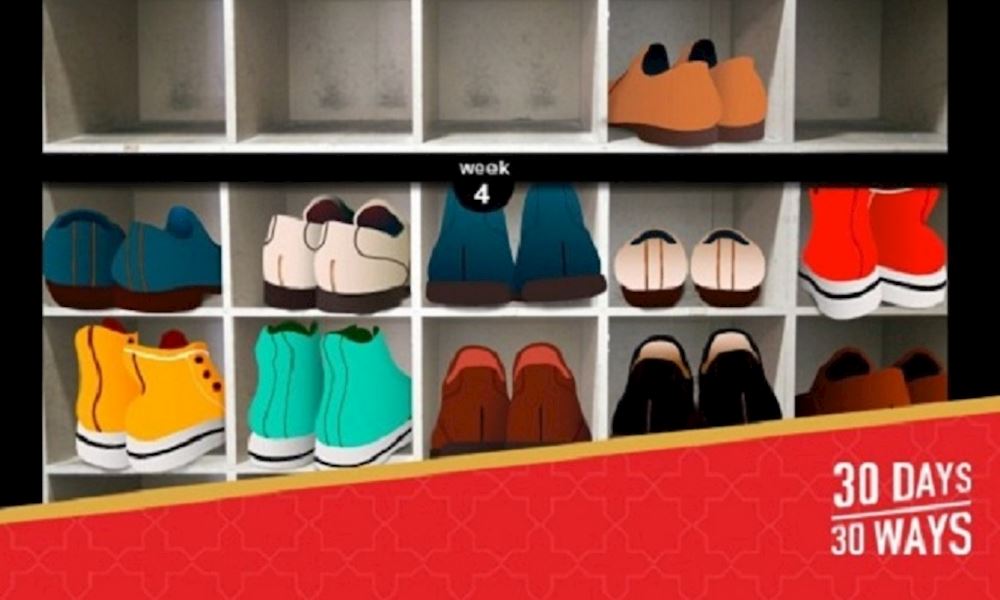
Hasan al-Basri said, "Improve your performance in what is left (of time) and you will be forgiven for that which has already passed. So take special care of the time you have left because you do not know when your soul will be turned over to Allah’s Mercy.”
Commonly in Ramadan we tend to start the month dedicated to worship, but as the weeks pass, we dwindle. We may be a little ashamed of this, but Ibn Taymiyyah said, “The lesson lies in perfection of the conclusion of a thing, not in the shortcomings of the beginning of it.”
With only a few days of Ramadan left, close the month with your heart completely devoted to Allah, and Allah, if he wills, will forgive you for the rest.
Day Twenty Eight
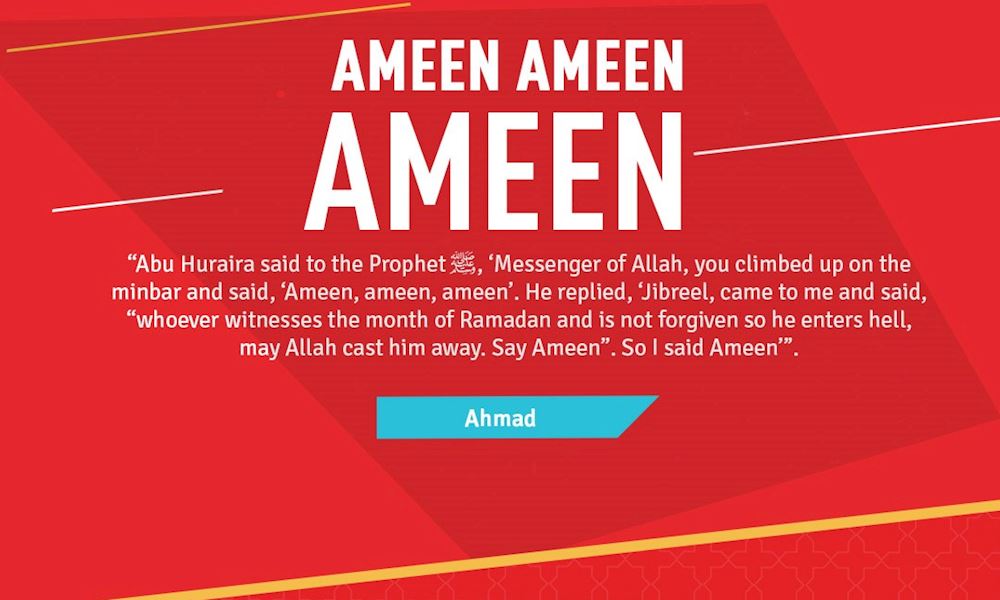
This hadith demonstrates that Ramadan is the month of repentance, forgiveness and ransom from the Fire. It is the month of goodness and blessing, the month of generosity and kindness. Allah is most forgiving, but He is especially forgiving during this blessed time, and so we have no excuse but to turn to him for mercy.
The Prophet (saw) had said ‘Ameen’ at the end of the dua, and a dua made by the Prophet (saw) in which one is cast away, is not a dua you want to be on the receiving end of. Protect yourself: repent, repent, repent.
Day Twenty Seven
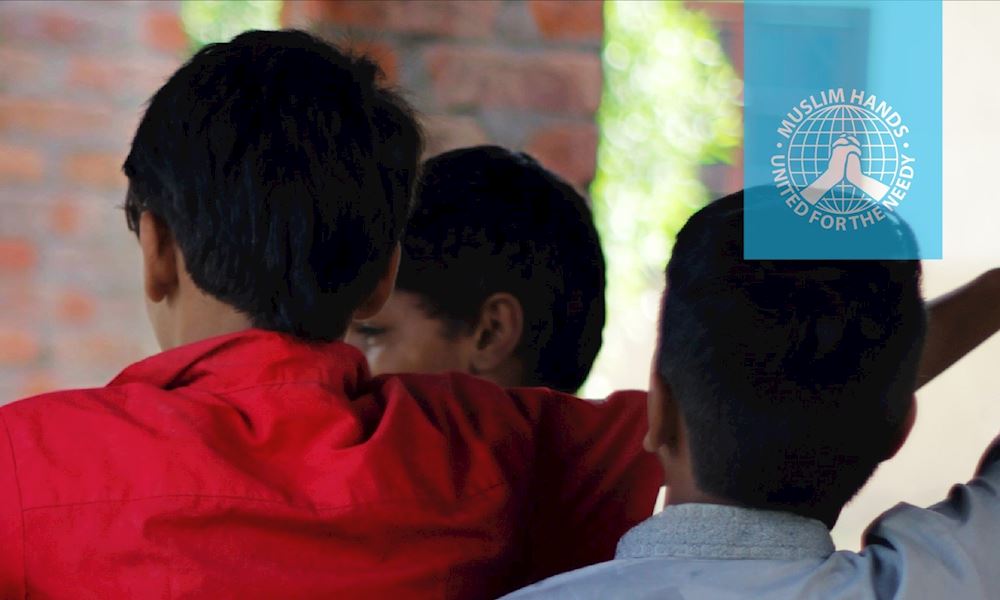
Adam*, Moosa* and Yusuf* are just like any other children their age, enjoying education, sports with their friends and extracurricular activities after school. It’s hard to believe they had such a rocky start to life.
Born in New Karachi, they lived with their mother, who used to work, and their father who visited regularly from Dubai. Their mother developed an interest with one of her colleagues, which ultimately led to an unfortunate turn of events for the young brothers.
Their father discovered her interest in another man and divorced her, abandoning his sons too. Their mother then moved with the three brothers to her parents’ house located in central Sindh. One night, she overheard her parents and brothers planning to kill her and her sons. She gathered Adam, Moosa and Yusuf, and fled back to Karachi. There, she left the children at the Edhi centre. Frightened and confused, the brothers got passed from one NGO to NGO before they finally found refuge at the Azad Foundation rehabilitation centre that Muslim Hands supports.
Now aged 12, 8 and 7, they are under protection at the centre, where they are taking psycho-social counselling sessions, LSBE courses and going to school. Adam is very intelligent and often wins trophies and other awards at school. He recently took first position in his class, and his brothers Moosa and Yusuf excel in football. They are all members of their school Karate club and leading much happier lives.
*Names have been changed to safeguard identities.
Day Twenty Six
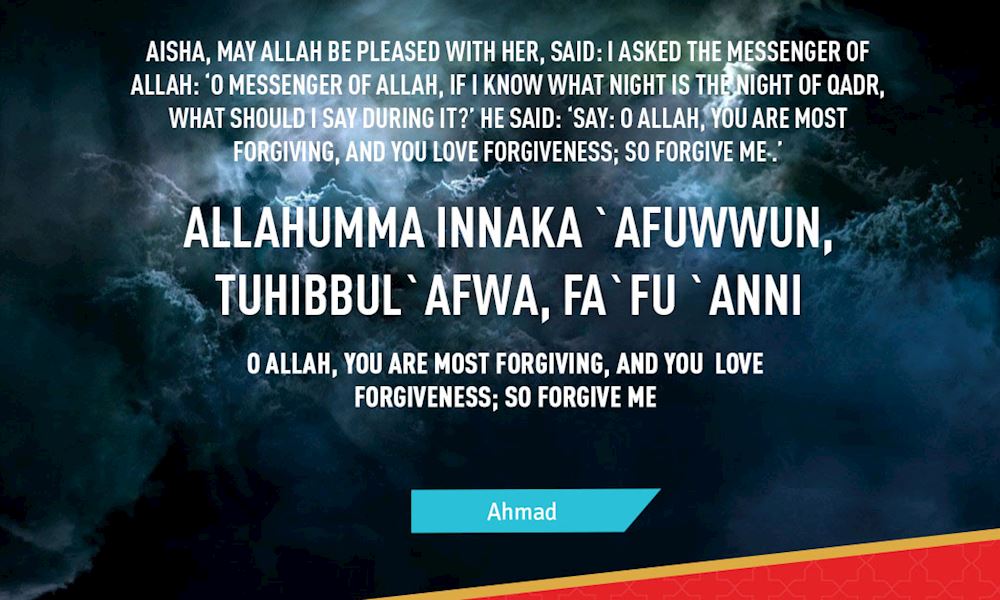
Layatul Qadr is the most holy night for Muslims. Unfortunately, we don’t know exactly when that night is, except that it falls on the last ten days of Ramadan.
Muhammad (saw) said, “Look for the Night of Qadr in the last ten nights of Ramadan on the night when nine or seven or five nights remain out of the last ten nights of the Ramadan.” – Bukhari.
Also regarding the night, it was narrated by Aisha (ra) that the Prophet (saw) had said, “Whoever prays during the night of Qadr with faith and hoping for its reward will have all of his previous sins forgiven." – Bukhari
Recite the this dua over and over in the last ten nights, and if Allah wills, all your past sins will be wiped away.
Day Twenty Five
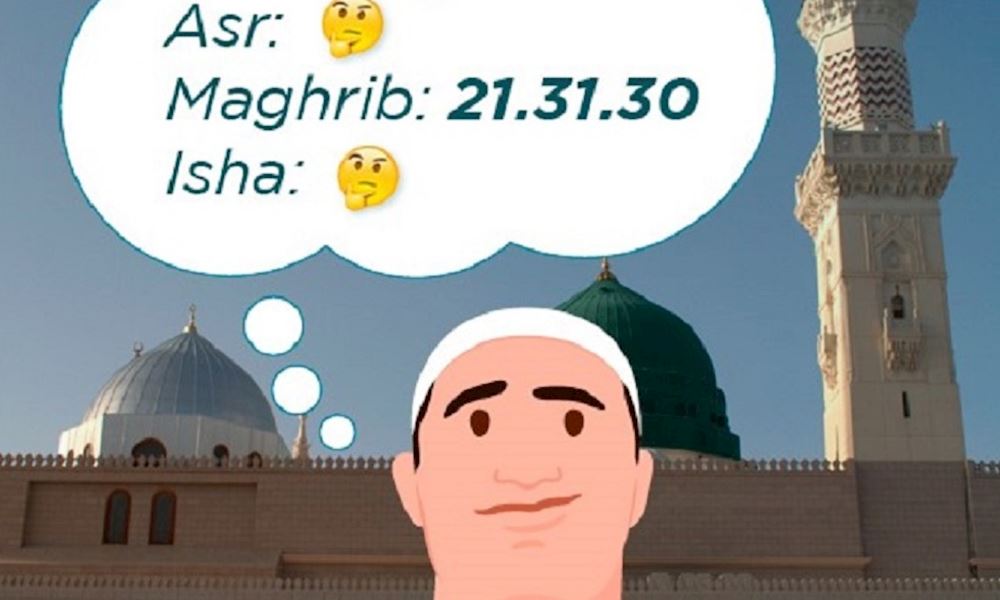
We’re all vaguely guilty of being only half aware of what time Salah starts. Well, the Salahs that aren’t Maghrib that is– the time we break our fasts.
Mu'adh bin Jabal (ra) reported Allah's Messenger (saw) as saying, "If anyone abandons prayer intentionally he has no claim to Allah Most High" (Ahmad).
Make it your mission to make Salah your priority.
Day Twenty Four
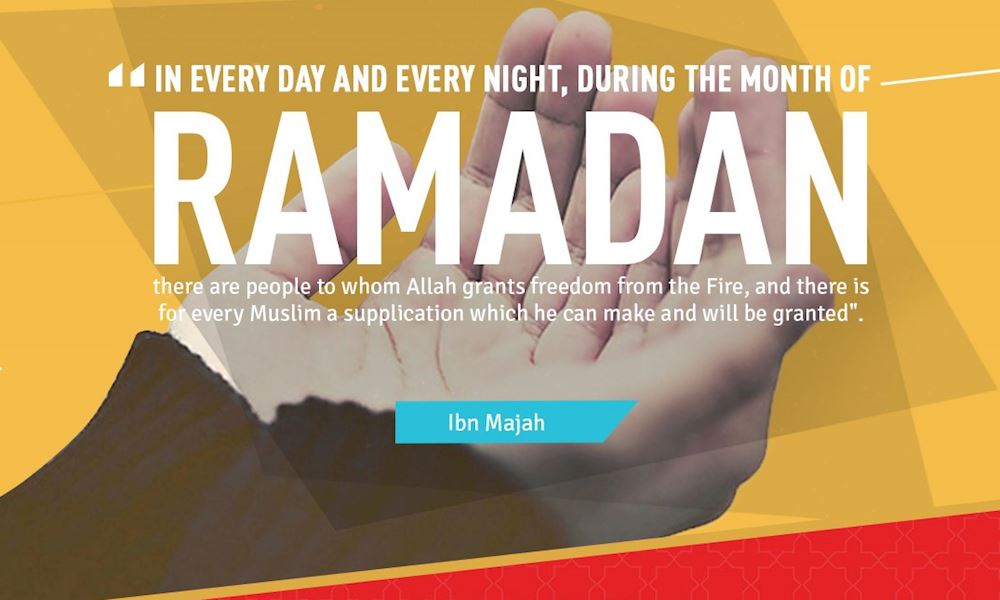
The hadith illustrates how the supplication of a fasting person is accepted. The hadith does not say that the supplication may be granted, but rather that it will. In some shape or form, Allah will respond to our duas.
Before breaking your fast, sit with your food in front of you and ask Allah whatever your heart desires. Abu Hurayra narrates that the prophet had said, “Whatever is prayed for at the time of breaking the fast is granted and never refused." (Tirmidhi)
Allah has blessed us with opportunity after opportunity to turn to him and ask him for anything we want; use this chance to ask Allah to grant you success, not only in this dunya, but the next too.
Day Twenty Three
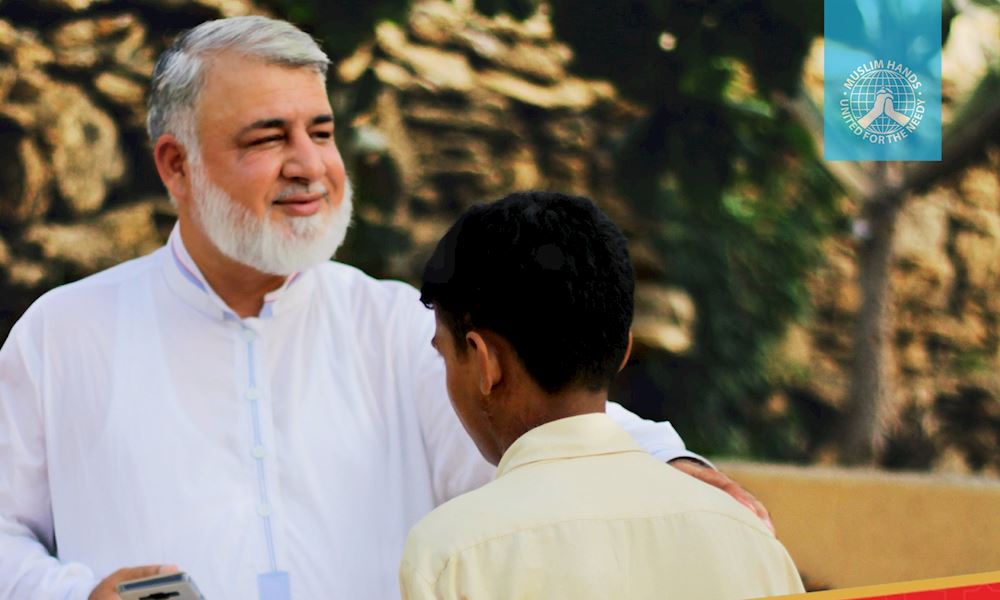
18-year-old Abdul* is originally from Mirpur Khas. He comes from a family of 16 members, of which he is the youngest. He was often physically abused by his father. However, there was one particular incident he recounted to us that led to him ending up on the streets at an extremely young age.
He had been asked by his father, who had just come home from work to bring him a glass of water. When doing this, Abdul accidentally dropped the glass, spilling its contents. His father lost his temper and beat him more severely than ever before.Abdul recalls that at one point he thought he was going to die. He ran away that day and boarded a random train about to leave the station. That train brought him to the crowded city of Karachi.
He was just eight years old.
In Karachi he resided in a railway station for 7 months Alone and vulnerable, he sought protection in a gang. By the time he was 10, he had moved to the town of Saddar in Karachi, where he was exploited further; forced to take drugs and sexually abused by his employer.
Then another child told him about the Muslim Hands supported Azad Foundation and their rehabilitation centre open 24 hours to children seeking shelter. By the age of 12, he lived in DEHLEEZ, the Azad Foundation’s Transit Care Shelter for Street Children. He received psycho-social and counselling sessions, as well as being enrolled on vocational training courses to help him get a stable job.
Now aged 18, he has been rehabilitated into his family and is looking forward to a brighter future.
*Name has been changed to safeguard identity
Day Twenty Two
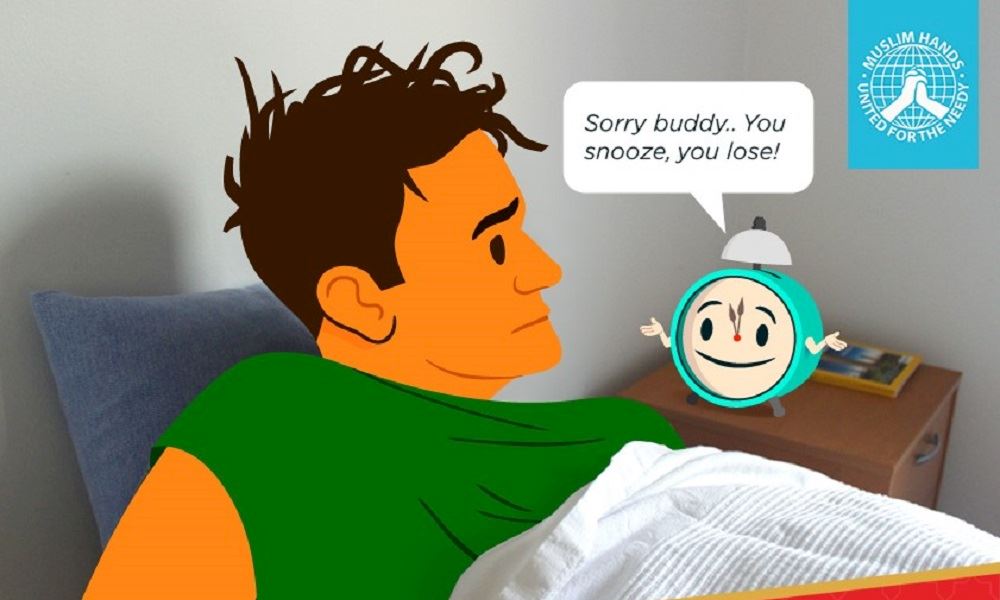
The Prophet Muhammad (saw) said, “Whoever prays Fajr is under the protection of Allah,” and, “The two sunnah cycles of prayer preceding Fajr prayer are better than this world and all that it contains” (Muslim).
Surely, Fajr is one of the hardest salah prayers, and with the days being so long, we’re all pretty drained during this time. But it is during Fajr (and Asr) time in which the angels are asked by Allah (swt) what His servants are doing.
“There are angels who take turns in visiting you by night and by day, and they all assemble at Fajr and Asr prayers. Those who have spent the night with you ascend to the Heaven and their Lord, Who knows better about them, yet asks, ‘In what condition did you leave My servants?’ They reply, ‘We left them while they were performing salah and we went to them while they were performing salah'” Bukhari.
More so than that, as we all know, Ramadan is the period of the year in which we ask for forgiveness, mercy and protection from the hellfire. Well, the Prophet (saw) told us, according to Muslim, “Whoever performs the prayer before the rising of the sun and the prayer before its setting will not enter Hell.”
If we miss these blessed opportunities during the blessed month, we are without a doubt, among the losers.
Day Twenty One
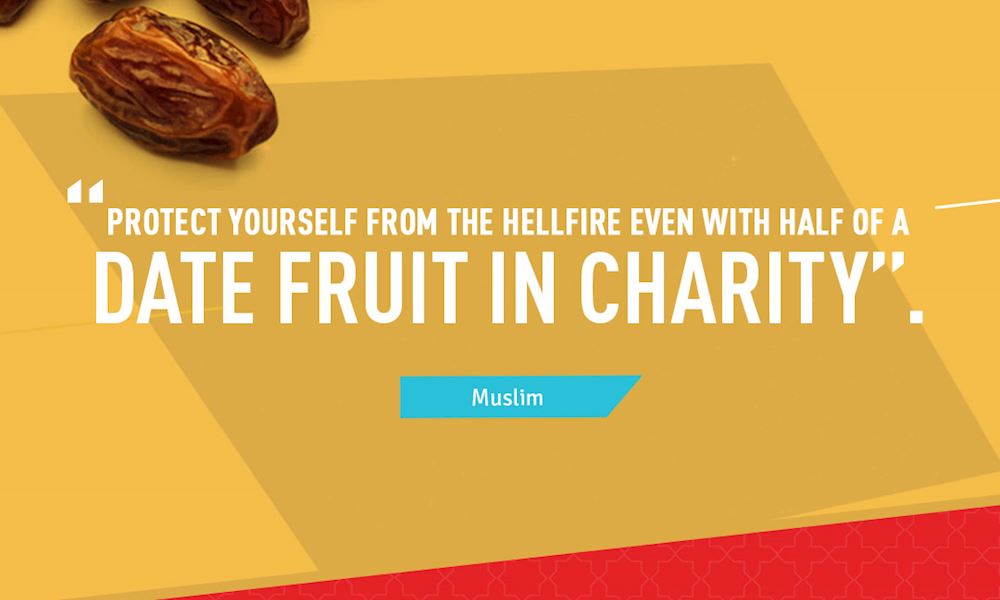
Now we're in the last ten days of Ramadan, don't miss out on the reward of having your charity multiplied. Check out our Ramadan appeals here
Day Twenty
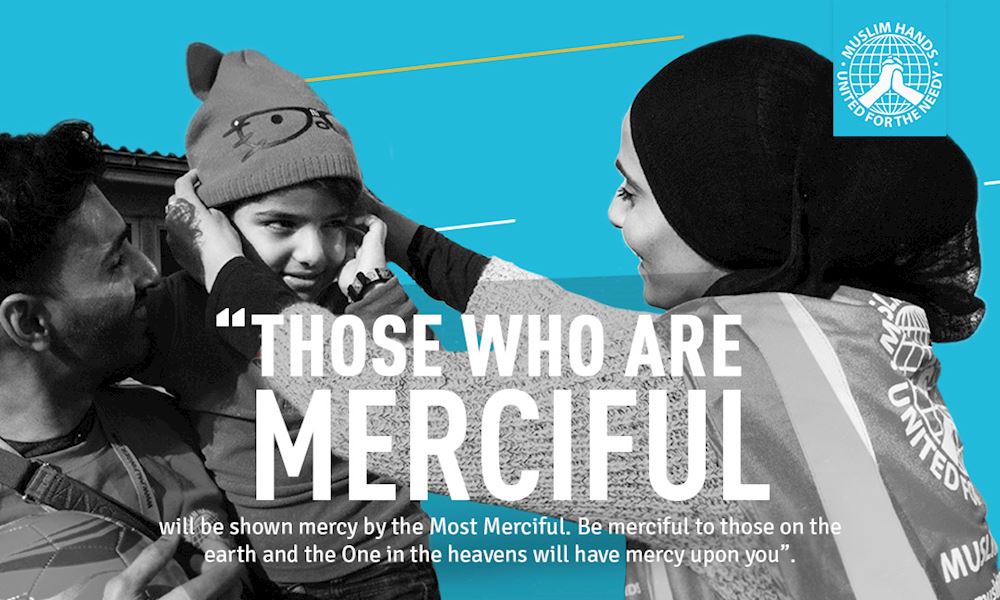
To be merciful is to show forgiveness and compassion to those in need. We are blessed if we are merciful, because mercy is something God Himself displays and it consists of treating people better than they deserve from us.
Forgiveness is a type of mercy, as is aiding someone whom we have no obligation to help, or forbearing to exploit someone’s vulnerability. We should help others, regardless of how we feel about them or what our relationship is to them. Who are we to ask Allah (swt) to forgive and have mercy on us if we cannot share the same sentiment with our fellow humans, who are just as fallible as we are?
This Ramadan forgive, help those in need, and remember Allah.
Day Nineteen
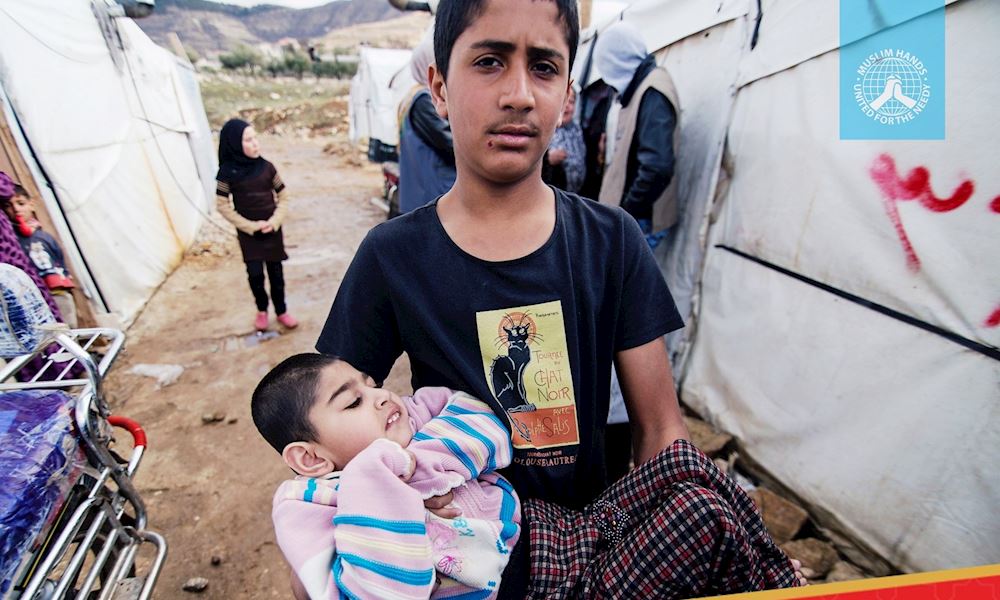
Abdul was nine years old when he had to flee his home town of Homs because of all the bombs. For the last three years he’s been living in a tent in Lebanon with his mum and brother. His father has passed away and his brother is disabled, so he has to work to support his family. Now that he’s 12, he feels embarrassed that he can’t read and write, but he can’t go to school. His family needs him.
When Abdul gets back from work he feel extremely tired, but he can’t rest because he has to help his aunt look after his cousin, Afraa. She’s six years old, but her disability makes her like a baby so she can’t do anything for herself. Afraa is Abdul’s favourite cousin. She smiles every time she sees him and cries for him when he’s at work. His aunt says the therapy she was receiving in Syria was really helping her, but since they’ve been in Lebanon, her condition gets worse with every passing day.
Muslim Hands helps us with warm blankets and clothes and they bring the famaily food for his mum and aunt to cook. Abdul told us he doesn’t know what he would do without Muslim Hands donors. Please don’t forget them this Ramadan.
Day Eighteen
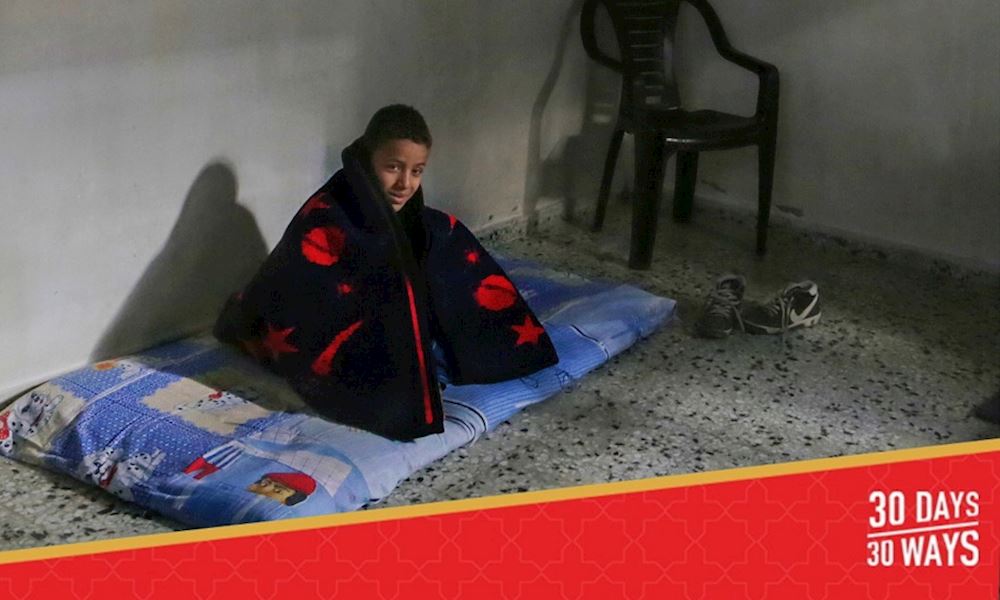
The conflict in Gaza is ongoing and it is the children who are paying the price. 10-year-old Hussein Abu Jara is one of those kids. He told our team that he has aspirations to be an engineer, undeterred by the unforgiving environment he is having to grow up in.
“I believe in Allah,” he asserted. “He will not leave me despite the harsh situation I’m currently living in.”
Hussein’s Room is barren other than his Quran, two chairs and a thin mattress. When we asked him what he wanted, he didn’t ask for much, just a bed, maybe a sofa and cabinet.
The Prophet (saw) said, “The one who cares for an orphan and myself will be together in Paradise like this,” and he held his two fingers together to illustrate.
Day Seventeen
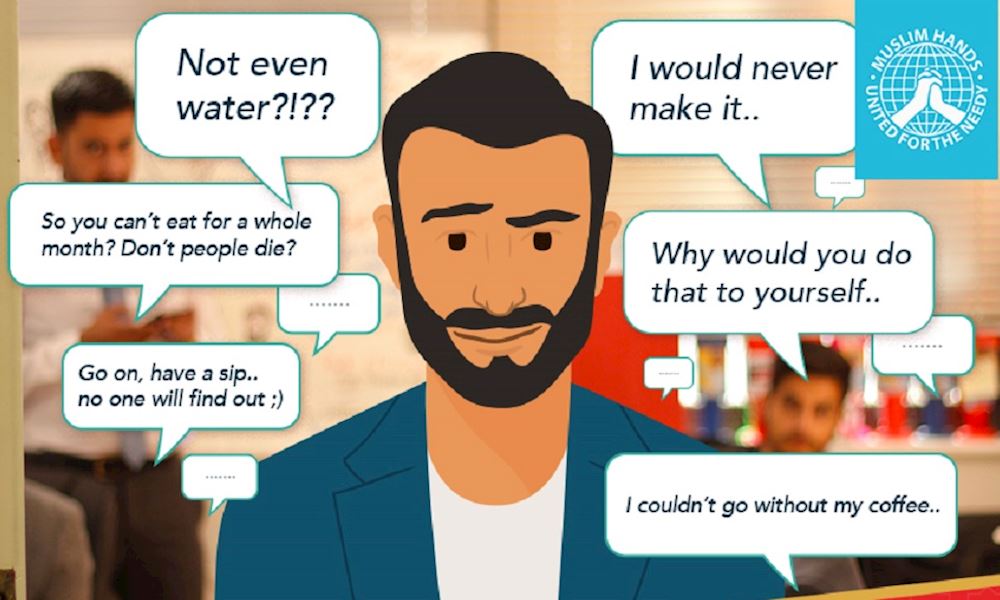
We all get questions in Ramadan that makes us want to roll our eyes. Sometimes we feel like it takes only common sense to realise that no, we don’t fast non-stop during Ramadan. However, no matter how exasperating these type of questions maybe, they present the best opportunity to give someone dawah. Teach someone why we fast, how fasting is more than just not eating, that it’s a time to cleanse the soul and return to the path of Allah.
Allah (swt) says in the holy Quran, “You are the best nation produced [as an example] for mankind. You enjoin what is right and forbid what is wrong and believe in Allah.” – 3:110
“Invite to the way of your Lord with wisdom and good instruction, and argue with them in a way that is best.” – 16:125
Dawah is a duty, a responsibility, assigned on every Muslim by Allah, as Allah has clearly mentioned in the Qur’an that He has appointed the Muslim ummah as a model community for the whole of mankind. You don’t need to be a Shaykh; the Prophet (saw) said, “Convey from me, even if it be an Ayah” (Tirmidhee). The goal of dawah to non-Muslims is not to convert them, but to inform and educate them about Islam and Allah.
Day Sixteen
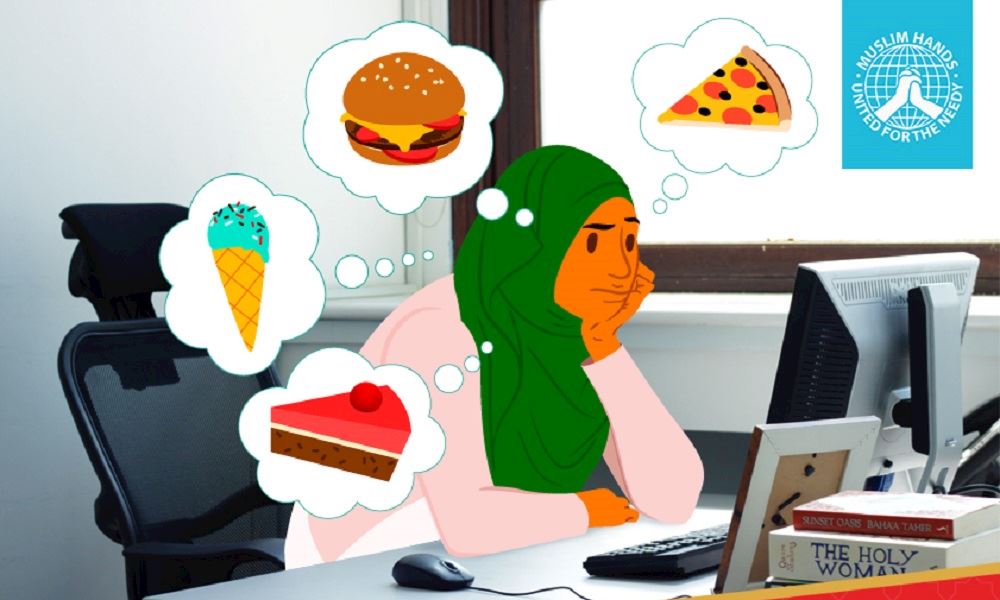
This month is not just about starving yourself, Ramadan is also about the mind. This month is about eliminating ourselves of anger, being patient and letting our souls be cleansed of any hate or frustration. It’s about not allowing your emotions to overtake your life. Abstain from yelling, gossiping and jealousy overall. Doing little positive things like saying hello to a stranger are part of cleansing yourself during this important month.
Cleansing can be done by praying five times a day, meditating, doing things for the less fortunate or even speaking kindly to someone. It all depends on the person. By spending 15 hours a day not eating, it makes you realize how much you have. It puts things into perspective. It teaches you discipline and patience, and it reminds you to count your blessings.
So don’t spend your day thinking about what you will eat for iftar. If you don’t use this month to become a better Muslim and person, all you’re achieving from fasting is starving yourself.
Day Fifteen
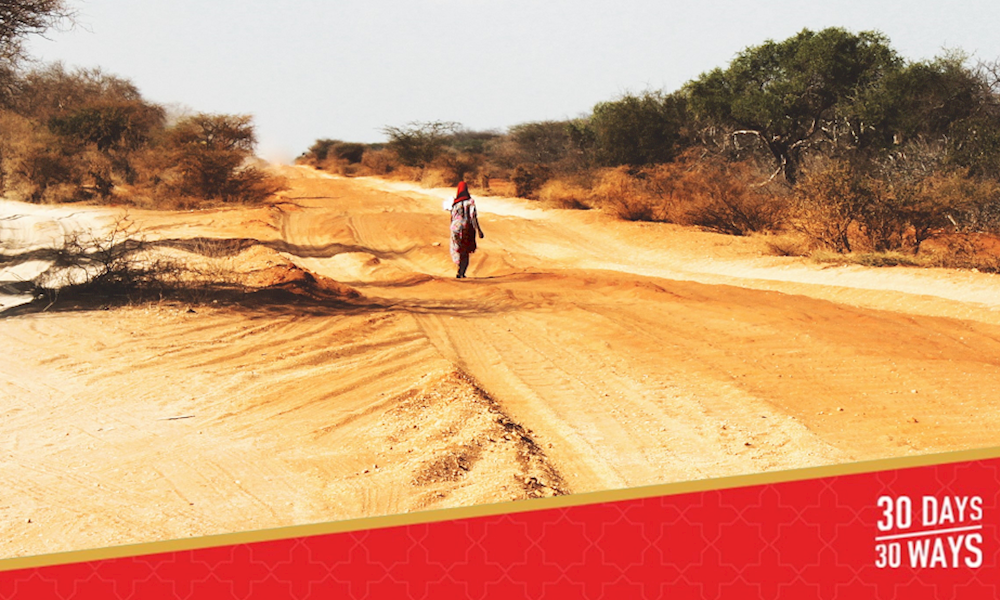
Our team met Khadra while she was sitting in a self-made and visibly poorly constructed tent, carrying her one-year-baby. There was no hiding her vulnerability and weakness as she clutched onto her small child and attempted to shelter him from the unforgiving heat with her scarf. They had very little concealment to tackle the harsh elements of their surroundings, and as their bodies faded, it was apparent that their hope was fading too.
A year ago, Khadra’s husband had passed away from pneumonia leaving her alone to take care of her new infant. Since then, she has walked 30 km on foot to the food and water distribution camp in Quljeed. Khadra and her child’s livelihood depend on animals. However, any livestock that she had possessed fell fatal victim to the drought. She no longer has any cattle, personal belongings, or anything of any worth. This was evident from the extremely sparse nature of the tent she has come to call home.
“If I were to bring something with me I would feel heavy,” Khadra told our team. “So do I walk all that way in the hot sun carrying my baby, or the items? I have nothing to lay on the ground or sheets to cover us. My baby and I just lay on the bare ground. Please help us. I cannot do this alone.”
When faced with the question of what her future holds for her, Khadra had cried, “I have nothing to go back to anywhere. Ahmed is my only concern, more so because he has influenza from being exposed to the elements. I breastfeed him, but because we are both malnourished, it is not enough.
Apart from Ahmed, I have nobody. I only know the woman next door because she comes from the same clan as me, but she has her own children and commitment. How can she help me?”
Day Fourteen
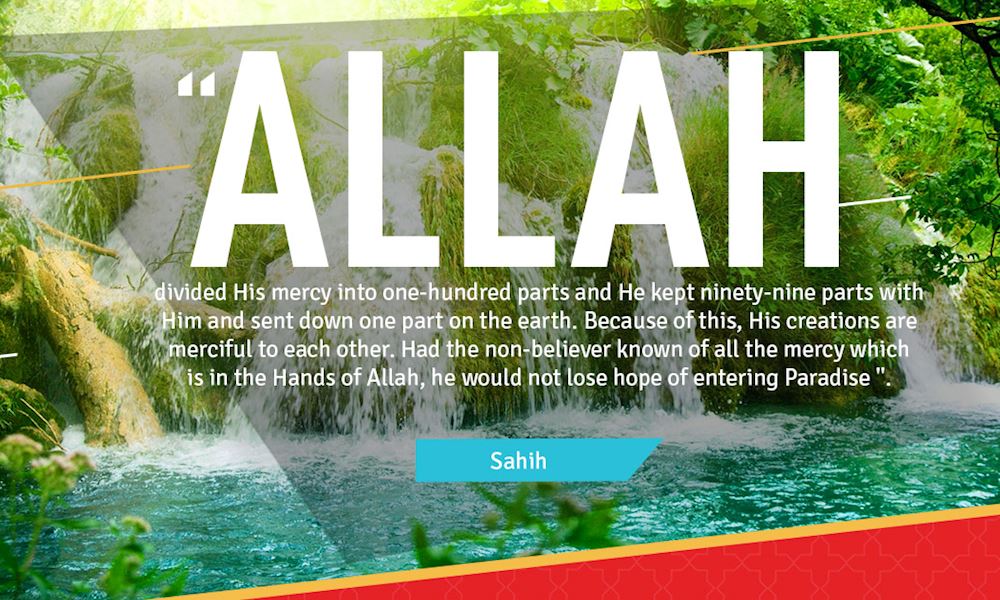
The ninety-nine parts of Allah’s (swt) mercy is reserved for the Day of Judgement. The one single part of mercy, which He sent down is the cause of all the love and care that is seen on earth by any and all creatures, since creatures first came into existence, until the end of their existence at the end of time.
We’ve all come across the name Mother Theresa and Ghandi, often using those names as synonyms for those who do good, for those who are kind, and those who are merciful. These figures, however, only have a minuscule portion of the mercy Allah has with him in the Heavens. In fact the mercy we contain within ourselves is a mercy from Allah (swt) itself, as without it, there would be far more injustice in the world.
This Ramadan, appeal to Allah’s mercy, the Most Merciful, and take advantage of His compassion.
Day Thirteen
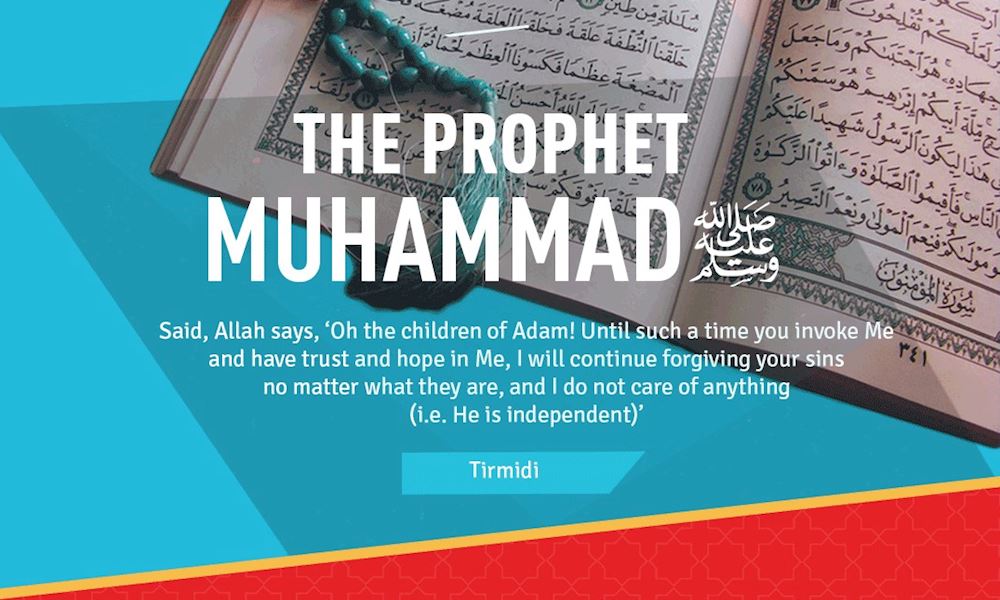
Sometimes you may find so much darkness in yourself that you stop believing you have any light left inside your soul. A miner doesn't stop searching for gold and diamonds because he comes across so much charcoal. He carries on searching, because he knows they're hard to find but it’s there. Just because you find many flaws within yourself, or find dirt in your heart, it does not mean you stop searching for the light of Allah.
He will continue forgiving you, so long as you ask.
Day Twelve
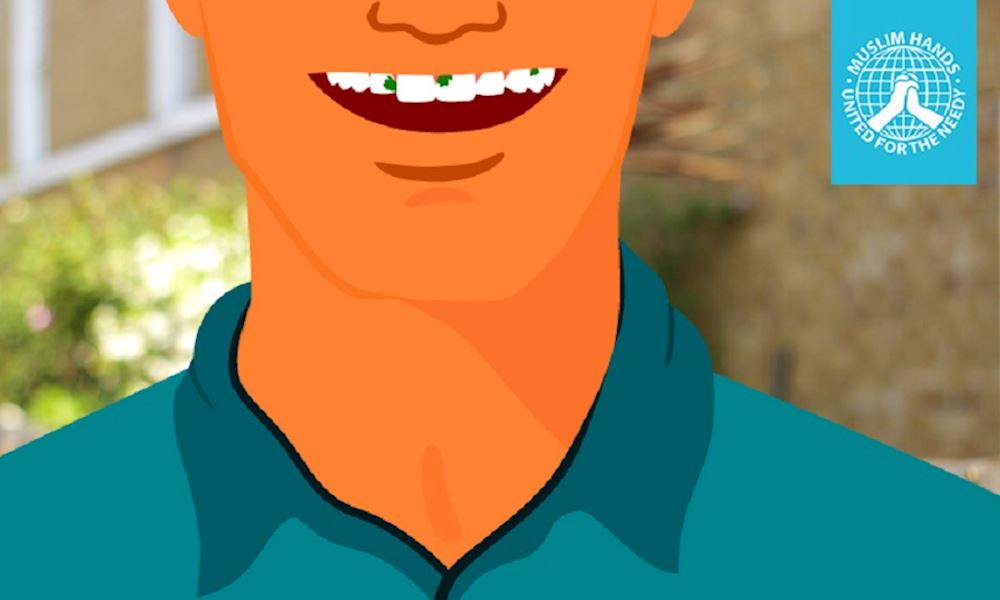
Greet others with a smile on your face, after all it is a form of sadaqah. However, make sure that smile doesn’t make anyone want to cringe. It’s Sunnah to use the Miswak after eating, and in doing so, you will receive a great reward from Allah.
We should also use it before praying, as the Prophet Muhammad (saw) said,"Had I not thought it difficult for my ummah, I would have commanded them to use the Miswak before every salah.'' (Muslim)
Get into the habit this Ramadan, and then upon its completion, continue during the following times for when it is also Sunnah:
1.For the recitation of the Qur'an.
2. For the recitation of Hadith.
3. When the mouth emits an odour.
4. For the learning or teaching of virtues of Islam.
5. For making Dhikr.
6. After entering one’s home.
7. Before entering any good gathering.
8. When experiencing pangs of hunger and thirst.
9. After the signs of death are evident.
10. At the time of sehri.
11. Before and after meals.
12. Before undertaking a journey.
13. On returning from a journey.
14. Before sleeping.
15. Upon awakening.
Day Ten
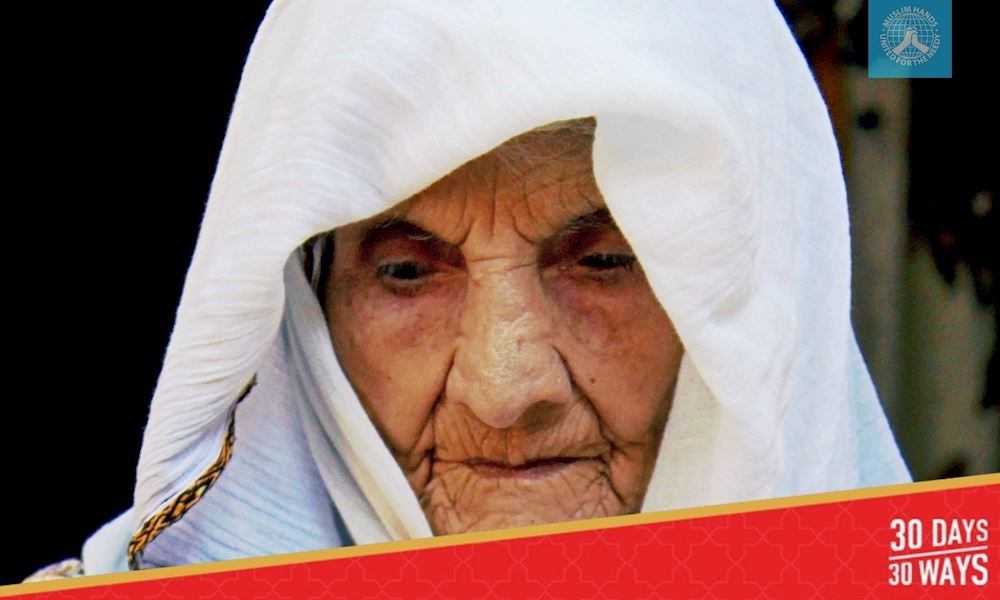
The Muslim Hands team went to visit Raziya in Islamabad, Pakistan. Her home wasn’t like the other homes – the team didn’t know where to move – not out of courtesy, but simply because there was no room for them to move. Cramped into the small room were two straw beds, each with an elderly lady sleeping on them, and beside one of the beds were two cows a little wooden stove.
Having lost her husband at a very young age, Raziya lives with her blind grandmother and elderly mother, for whom she provides. Asking how she earned her income, Raziya looked down and told us how she used to look through garbage to find plastic to sell, but ever since she received a cow from Muslim Hands she has been able to sell fresh milk every morning to local families and to the nearby market from which she buys food. She was also looking to have a mud roof built with some of the money she said, with a beaming smile.
One of the elderly ladies, waking up, summoned one of our team members to sit on the bed with her. Our team asked her, ‘So what’s the best thing about the cow?’ She sat up and immediately shouted with excitement ‘doood’ – milk! Elated at her joy, our team member hugged her. Her daughter explained that it’s not the money they receive from selling the milk that brings them joy. It’s the fact that after 35 years, her mother and grandmother have finally been able to have tea again – with milk! A novelty they thought they’d never experience again.
As we kissed the ladies goodbye, Raziya’s elderly grandmother hugged us tightly and said, ‘Thank you for the cow. I don’t know who gave us this cow but I pray for them every day’.
That night as we travelled back to Islamabad it thundered and rained heavily. The car was eerily silent as we pondered each to ourselves how would Raziya and her elderly mothers get through the night with no roof to keep out the rain.
Day Eleven
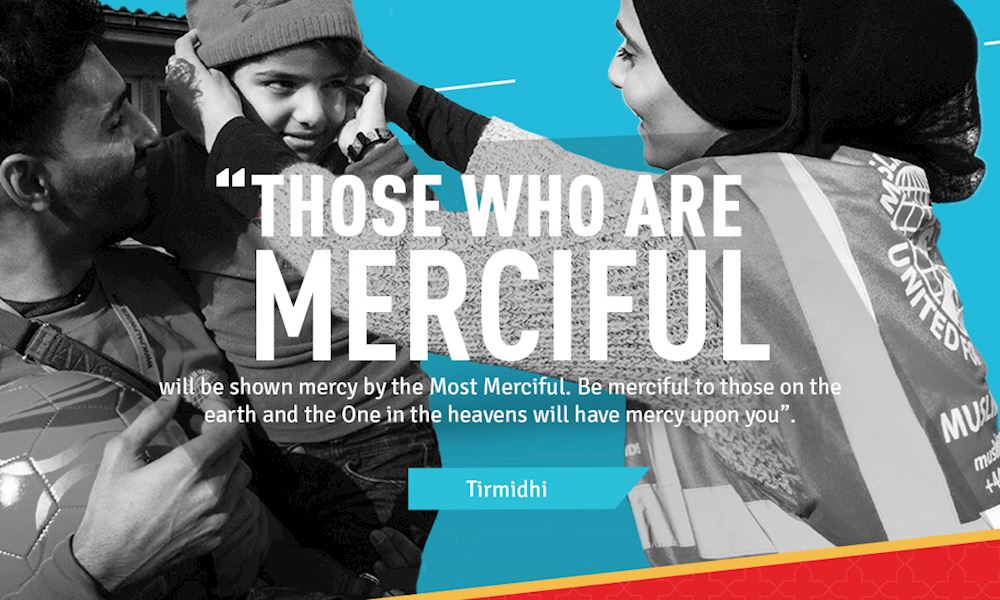
The Muslim Hands team went to visit Raziya in Islamabad, Pakistan. Her home wasn’t like the other homes – the team didn’t know where to move – not out of courtesy, but simply because there was no room for them to move. Cramped into the small room were two straw beds, each with an elderly lady sleeping on them, and beside one of the beds were two cows a little wooden stove.
Having lost her husband at a very young age, Raziya lives with her blind grandmother and elderly mother, for whom she provides. Asking how she earned her income, Raziya looked down and told us how she used to look through garbage to find plastic to sell, but ever since she received a cow from Muslim Hands she has been able to sell fresh milk every morning to local families and to the nearby market from which she buys food. She was also looking to have a mud roof built with some of the money she said, with a beaming smile.
One of the elderly ladies, waking up, summoned one of our team members to sit on the bed with her. Our team asked her, ‘So what’s the best thing about the cow?’ She sat up and immediately shouted with excitement ‘doood’ – milk! Elated at her joy, our team member hugged her. Her daughter explained that it’s not the money they receive from selling the milk that brings them joy. It’s the fact that after 35 years, her mother and grandmother have finally been able to have tea again – with milk! A novelty they thought they’d never experience again.
As we kissed the ladies goodbye, Raziya’s elderly grandmother hugged us tightly and said, ‘Thank you for the cow. I don’t know who gave us this cow but I pray for them every day’.
That night as we travelled back to Islamabad it thundered and rained heavily. The car was eerily silent as we pondered each to ourselves how would Raziya and her elderly mothers get through the night with no roof to keep out the rain.
Day Nine
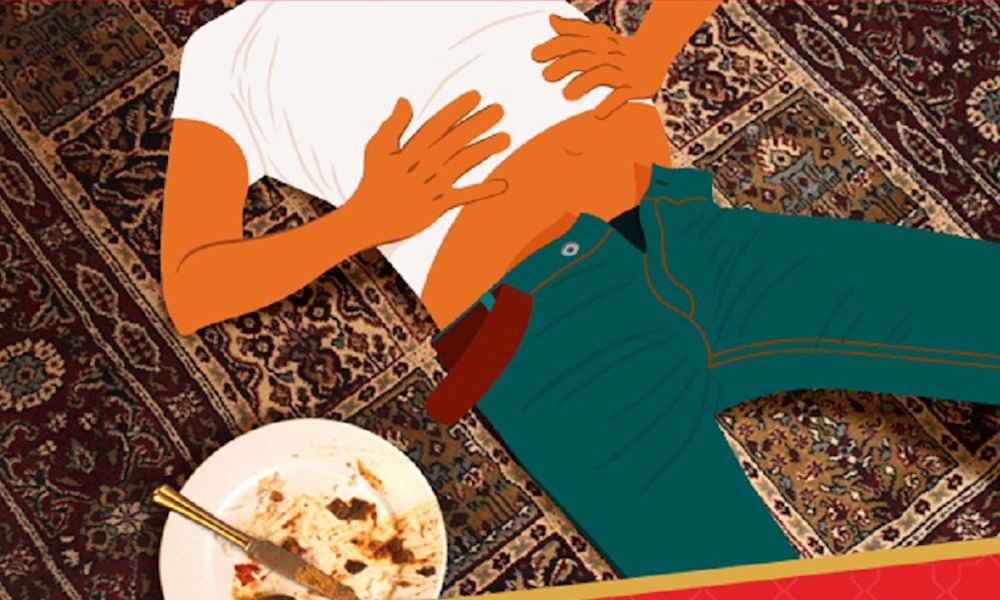
Allah says in the holy Quran, “O children of Adam… Eat and drink, but be not excessive. Indeed, He doesn’t like those who commit excess.” – 7:31
One of the etiquettes of a fasting person is to be moderate in his eating and drinking during the nights of the fast.
Pre-iftar, we can be the most pious we’ve ever been. However, many of us are guilty of turning iftar time in Ramadan into an annual season for exuberant table spreads filled with copious amounts of exotic foods. We can go out of bounds, exhibiting every possible manner of excess. The result of this behaviour is that a lot of money gets wasted, and a lot of people fall ill on account of overeating. Even worse, people find themselves too sluggish and tired after gorging themselves to engage in worship.
If one was to save the money they spend on extravagant food and conduct themselves appropriately, they could spend the extra money in charity, as they are supposed to do in Ramadan. They could feed the poor, the needy, and the orphan. They could give those who find themselves in restricted means a chance to break their fasts on something nice as well.
Day Eight
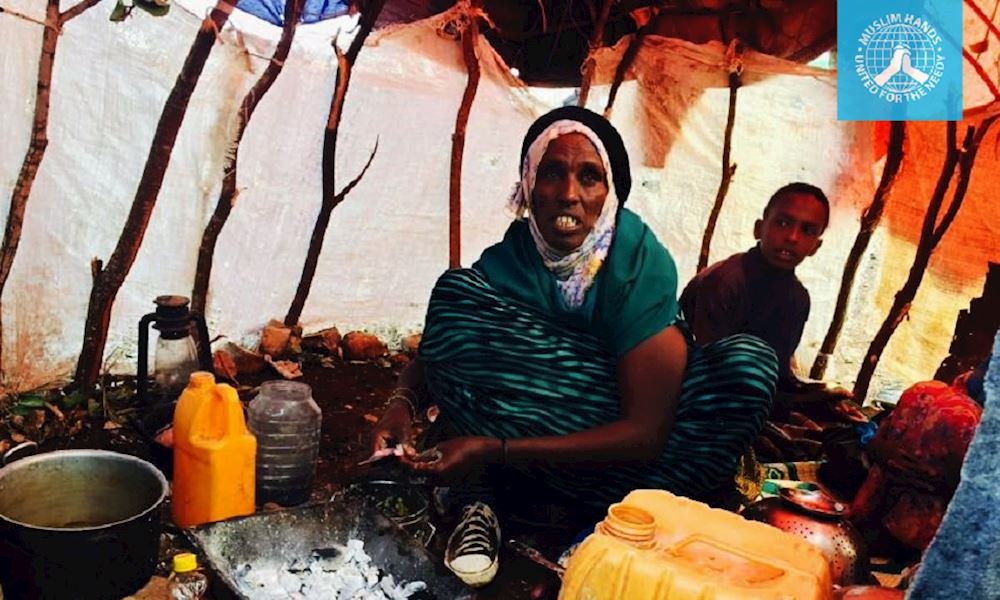
48-year-old Fatima Rople is an epitome of the consequences of this hard-hitting time. She was met by the Muslim Hands team in a temporary camp in Quljeed, district Boram, Somaliland. She is a widow with eight children to feed.
Distressed, she exclaimed to our team, “They are becoming more and more weak and I don’t want them all to fall ill and die the way my cattle have.”
Fatima’s children, four of whom are girls and the other four boys, range from the ages of 6 to 17. Her husband had been a charcoal buyer and they had cattle for milk and produce. Tragically, he passed away two years ago, leaving her to raise her eight children on her own in the increasingly impoverished environment. She told our aid workers,
“Since the drought has hit, our cattle have gone down from forty-eight to just two, the rest having died of famine and dehydration. I used to use the milk for the children, but the remaining two cattle are very ill, so their milk has dried up – it is just a matter of time for them too. All the wealth we had was in those animals.”
When faced with the question of what her future holds and how she will take care of her eight children, Fatima proclaimed,
“Ya Allah! Ya Rabbi, make provisions for us. I don’t want my children to die of hunger and thirst! We are relying on the aid handouts at this camp at the moment. When aid organisations come, then we get food. When they don’t come, we don’t eat and drink. I pray if only I get two cattle, I can survive.”
Regrettably, Fatima’s case isn’t unique. Eighty percent of the country’s most vulnerable groups are women and children. Our team in Somaliland have encountered countless cases like Fatima’s, with the numbers growing by the day.
Day Seven
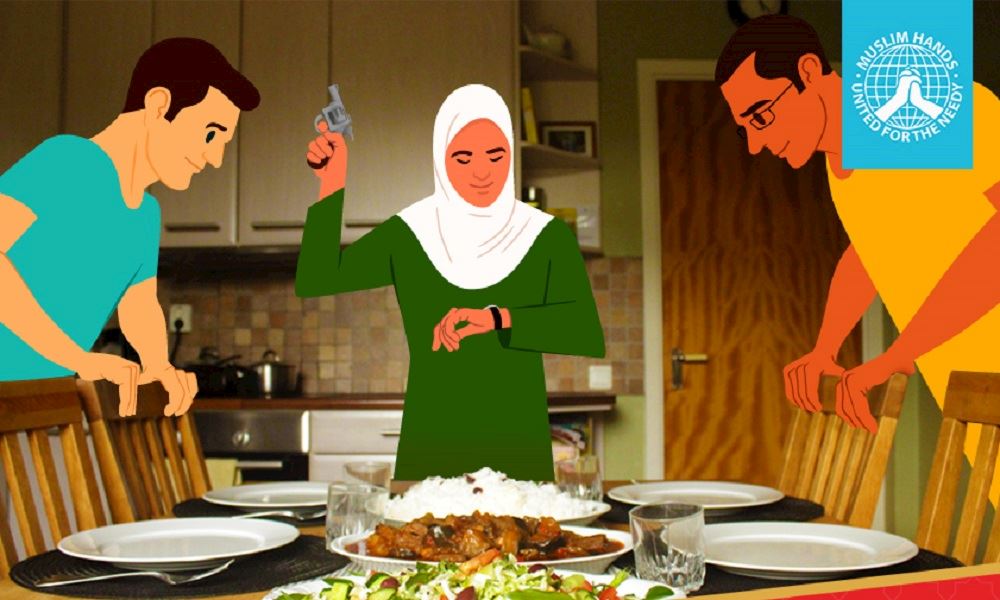
There is no reward for delaying breaking the fast, rather it is better to hasten to it as soon as the sun has set, as this brings a more complete reward.
Sahl ibn Sa’d narrates that the Messenger of Allah (saw) said, “The people will continue to do well so long as they hasten to break the fast" (Bukhari).
This hadith urges us to break the fast as soon as it is established that the sun has set. What this means is that the ummah will continue to be in a sound state, and they will be fine so long as they continue to adhere to this sunnah. If they delay it, that will be a sign that corruption has arisen among them.
Aisha (ra) was asked about a man among the companions of Muhammad (saw) – ‘Abd-Allaah ibn Mas’ood – who hastened to pray Maghrib and break the fast. She said, “This is what the Messenger of Allaah (saw) used to do” (Muslim).
Day Six
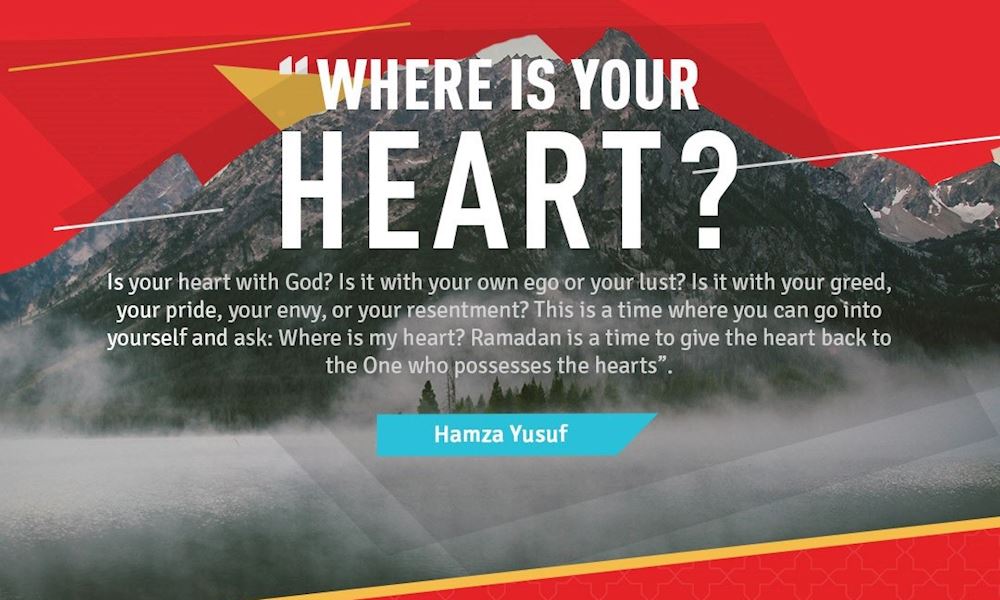
Characteristics like that described by Hamza Yusuf, are often characteristics of those destined for the hellfire. Fasting, however, cleanses one’s heart and soul of ego, pride and envy, and it subdues the desires and reduces their severity. It is an act of worship to fast, and because of this, fasting comes between a fasting person and the hellfire. Therefore, we encourage you to use the month of Ramadan to cleanse your heart and return it back to Allah (swt).
In regards to greed, the Prophet (saw) encouraged people to give to charity as much as they can during the month of Ramadan. Giving money to the poor or spending in the name of Allah has never decreased anyone’s wealth – the Prophet (saw) said, “The likeness of those who spend their wealth in the way of Allah, is as the likeness of a grain (of corn); it grows seven ears, and each ear has a hundred grains.”
What’s more, giving increases your wealth in the hereafter, so if you want to be greedy, be greedy for the rewards you will receive in paradise, for there is no better prize.
Day Five
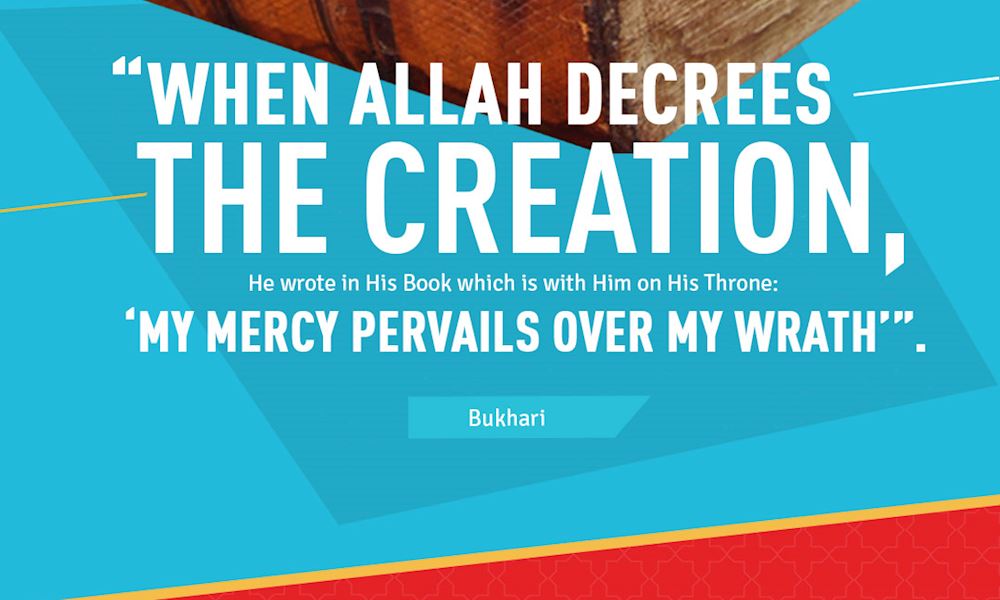
There are thousands of hadith, but this one is among those that are most reassuring. We have all undoubtedly sinned in our lifetime, some more than others, and some overwhelmed by their past misdeeds. Allah’s (swt) forgiveness is unending. We’ve all heard the story about the man who killed 99 people. If not, then in sha Allah it will put your hearts to rest.
A man who had killed 99 people had approached a monk to ask him whether he could ever be forgiven. When the monk denied him, the man killed him raising his death-toll to 100, considering that he would never be forgiven. He then went to an islamic scholar and asked the same thing, with the scholar replying that Allah is all forgiving. He then advised the man to journey to a pious land, because the land of his home was evil for him.
Upon his journey, the man passed away, and so the angels of Mercy and Torment came down and debated who had claim to him. The Angels of Torment argued he had no virtuous traits, while the Angels of Mercy argued that he had repentance for the sake of Allah in his heart. It was decided that if he had passed the halfway point of his journey, he would be forgiven. However, the man had only just set out on his travels when death overtook him. Allah (swt) is the only one who knew what was truly in his heart and saw it to be filled with sincere repentance, and so moved him closer to the land of good.
Truly our bad deeds can be magnanimous, but Allah has the power to wash it all away if we sincerely seek forgiveness. So use this month, the month in which Allah locks up the devil and multiplies all our good deeds to raise our hands to the Most Merciful and ask him to have mercy on us.
Day Four
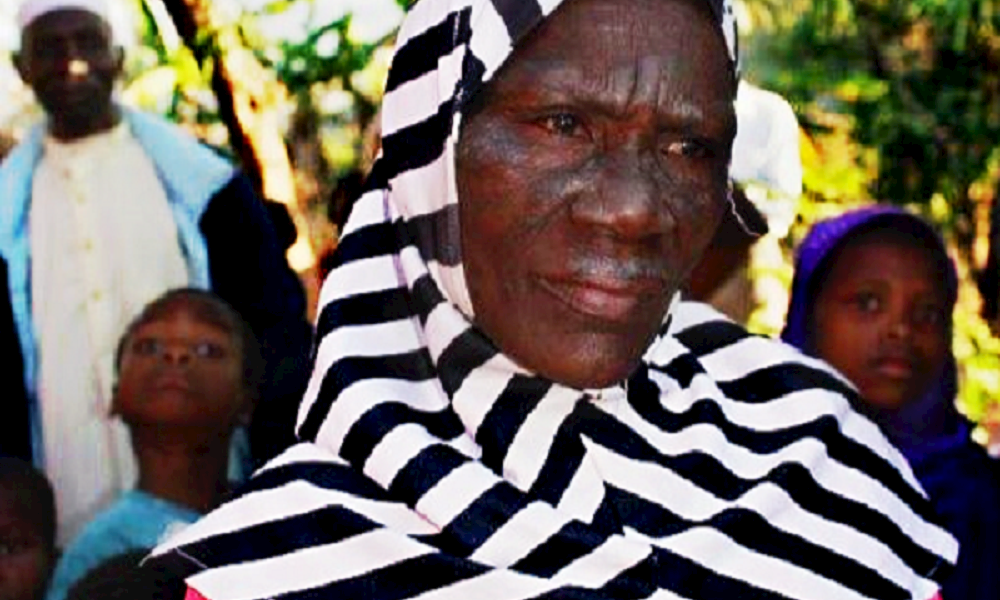
In a rural area, south of Blantyre, Malawi, 53-year-old Aisha Ibbu was having to walk over 15km to reach the nearest mosque. Fed up of travelling such distances, Aisha decided to donate her land to the building of a local mosque. With the help of a family from the area and a Muslim Hands volunteer, Ntonde Masjid was built. This structure is little more than a straw hut, but already it is bringing together members of the community.
Since the mosque was built, families in the area have been returning to Islam. Five years ago, only one Muslim family remained in the community, but now around forty people pray at the mosque every day.
As well as providing classes for children and services for congregational prayers, the mosque also holds communal iftars throughout Ramadan. Last year, as part of our worldwide iftar programme, Muslim Hands supplied Aisha and the other women who hold the iftars with enough food to serve the community throughout the month of Ramadan.
Aisha stressed the importance of the help she has received from Muslim Hands, saying, ‘Even if we didn’t have the food, people would still come to the masjid hoping to eat. Without MH we would only have a small amount of flour every day to feed everyone with’.
“Whoever gives iftaar to one who is fasting will have a reward like his, without that detracting from the reward of the fasting person in the slightest (Tirmidhi).”
Day Three
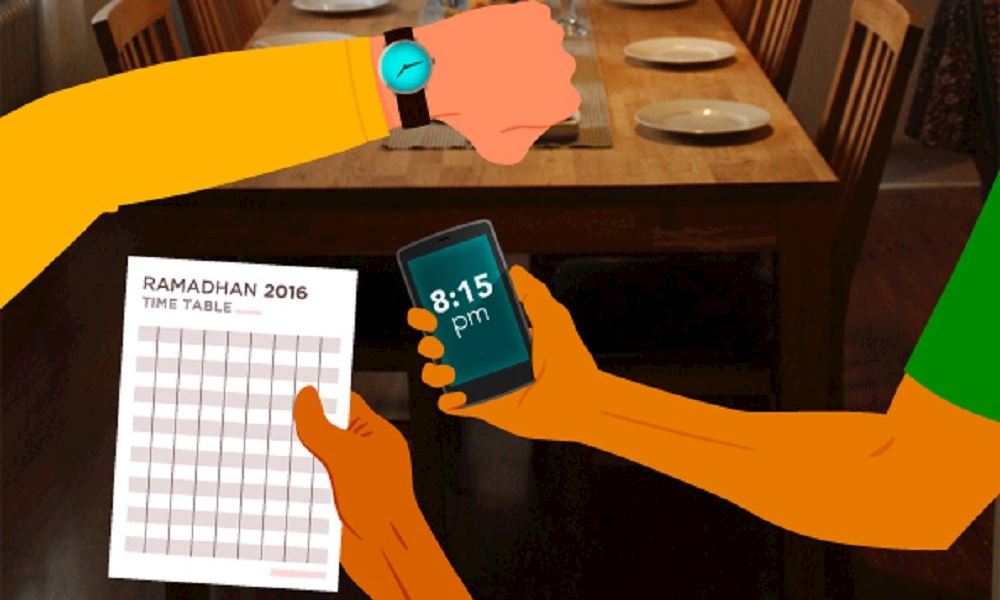
With Ramadan comes the unavoidable debate on which time to follow when iftar is approaching. One person will insist that the app on their phone is correct, while someone else will say that the Ramadan calendar you got from your local masjid has the correct time, or that the time on someone’s phone does not much the wrist-watch of another. It can go on and on and on.
Muslim Hands advises consistency. If you follow the time on your phone and app for all your salahs, all year round, and not just because it shows the earliest time, then follow that. If you follow the prayer times of your local masjid all year round, but their time is a minute later, continue using their time. It’s best not to switch up, simply because you want to play safe than sorry, or you can’t wait a minute longer – Allah knows your true intentions.
Day Two
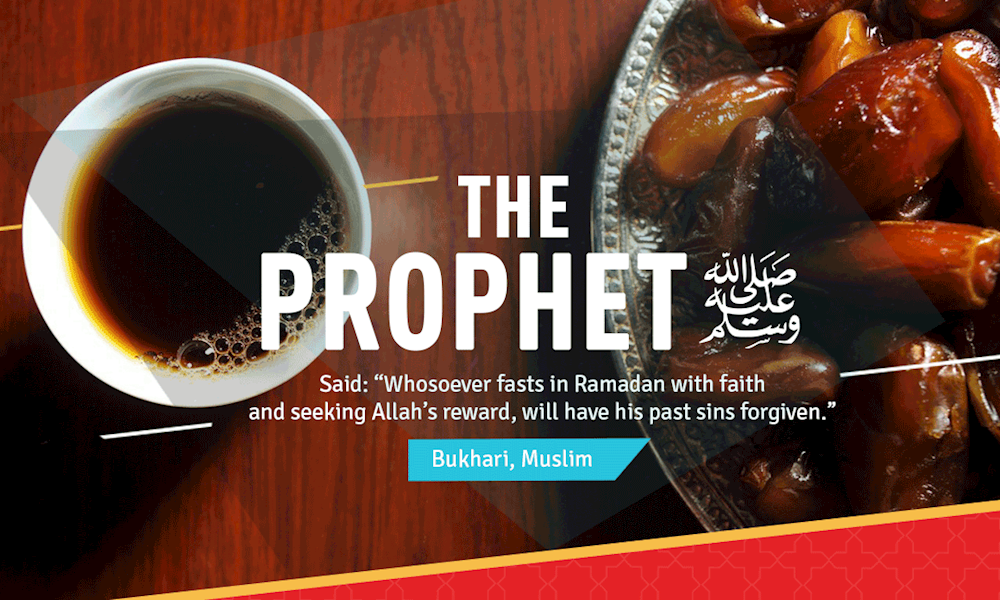
Allah has made fasting and spending the nights of Ramadan in prayer a means by which we can seek His forgiveness. This is proven by the hadith of Abu Hurayrah, according to which the Prophet (saw) said, “Whoever spends the nights of Ramadan in prayer out of faith and in the hope of reward, his previous sins will be forgiven” (Bukhari). For this reason, it is sunnah to pray qiyaam/teraweeh during Ramadan.
Fasting in Ramadan is a means of expiation for the sins committed since the previous Ramadan, so long as one avoids major sins, and one fast is equivalent to ten months’ worth. Most importantly, fasting brings us closer to Allah, as stated in the Quran, “O you who believe, fasting has been prescribed for you as it has been prescribed for people before you so that you will (learn how to) attain Taqwa" (2:183). So fasting in Ramadan not only atones for past sins, but by bringing us closer to Allah, it prevents us from future sinning, insha’Allah.
Day One
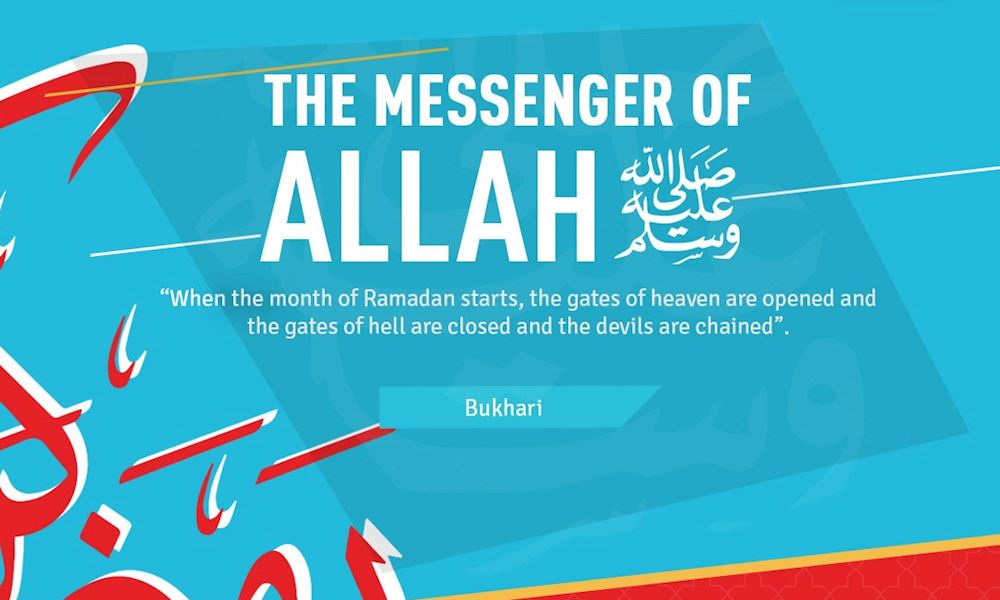
The Prophet (saw) told us that the devils are chained in the month of Ramadan. With the devils chained, it means we can no longer blame the shaytan's whispers for our misgivings in the holy month. Our wrongdoings are solely our responsibility.
While this may seem like a terrifying thought, it is actually an opportunity for us to realise what our flaws are, and what we need to do to tackle them in order to become better servants of Allah. Ramadan help us revaluate our priorities.
Fasting in itself is a form of cleansing, both for the physical body, and the spiritual heart and mind. However, it consists of more than starving oneself. It means being kind to others, keeping calm when angry, avoiding swearing and most importantly, remembering Allah in everything we do.
Muslim Hands wishes you the best of Ramadan and we sincerely hope it brings you all closer to Jannah, and by extension, closer to Allah (swt).
Welcome!
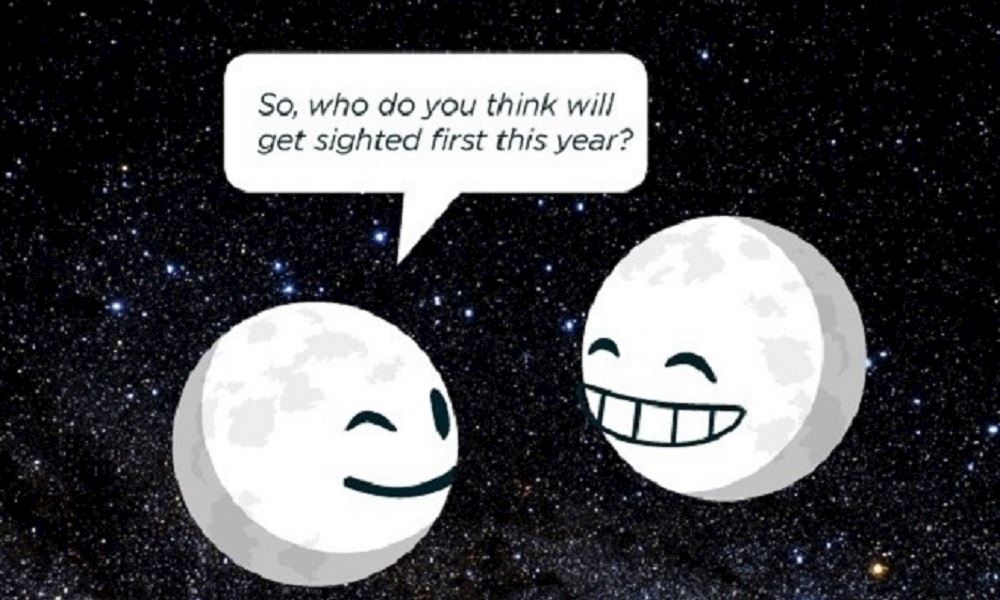
Every year, whether it’s the end of Ramadan, or the beginning of Ramadan, there is a debate out there, somewhere about the moon sighting. Some people insist they saw it and others don’t. Consequently, this means that Ramadan ends up starting on two different days, or people end up celebrating Eid on two different days.
Whether today is the day you start the month of Ramadan or not, make sure you stay in tune with our #30days30ways reminders to help you make the most of this month.
If you have any reminders of your own, use our hashtag so we can all benefit.

Established in 1996, Muslim Hands SA NPC is an aid agency and NGO aiming to help those affected by natural disasters, conflict and poverty. It is a branch of Muslim Hands UK established in 1993 in Nottingham.



